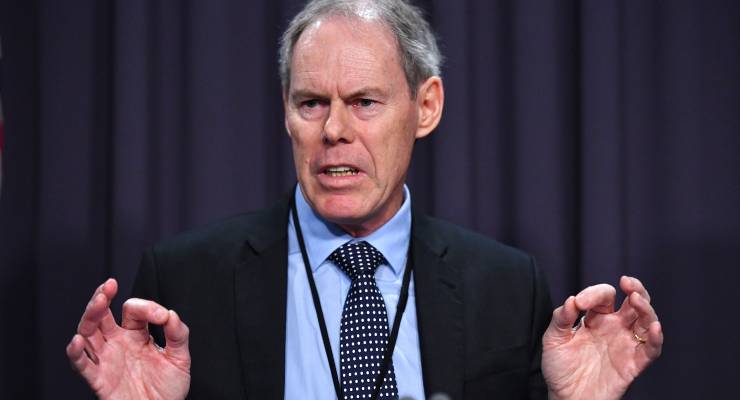
For someone whose nine-year parliamentary career three decades ago was completely forgettable, Gary Johns still manages to generate an extraordinary amount of press.
The former Labor minister has faced calls for his resignation or removal from the anti-Voice organisation Recognise a Better Way since July, when his proposal — floated in his 2022 book The Burden of Culture — that Indigenous peoples should undergo blood tests to prove their eligibility for welfare payments, was highlighted in the media. Johns told The Daily Telegraph criticisms of his comments were based on an “outrageous misrepresentation” and that people should read the book to form their own views.
As of this week, as reported in Guardian Australia, Johns remains involved in the No campaign, baffling observers who see his views as beyond the pale. But the important thing to note about Johns is that the malice that infects so much of his commentary is a feature of his public role, not a bug. He serves to draw out the nastiest elements of Australian attitudes towards First Peoples.
Raised in the working-class inner-west of Melbourne, Johns joined the Labor Party in 1972 at the age of 20. He later moved to Queensland and was elected to Parliament in 1987, serving three terms before losing his seat in Labor’s 1996 landslide defeat. Though he was a strong backer of Paul Keating in his battle against Bob Hawke for the prime ministership, his greatest reward was the outer ministry position of special minister of state for two years.
Johns was economically aligned with Keating and other neoliberals such as finance minister Peter Walsh, but was no Johnny-come-lately to the cause. “I became a right-winger in 1980, well before I was elected,” he told me during a 2012 interview for my book, Political Troglodytes and Economic Lunatics.
Having studied economics, he swiftly replaced his Marx, Hegel and Marcuse with Financial Review editorials, and saw the light of economic rationalism.
Johns’ first foray into Indigenous affairs was in 1991, when the Labor cabinet was bitterly divided over whether to allow mining at Coronation Hill in the Northern Territory. Having been lobbied by conservative anthropologist Ron Brunton (on behalf of mining interests), Johns pushed for approval, but to no avail. Hawke overruled his cabinet, and Coronation Hill was incorporated into Kakadu National Park and saved.
Johns described the decision as “a result of environmental and Aboriginal myth-making and mischief-making”, and the debate stimulated his interest in the “falsity” of Aboriginal politics: “I thought it was intellectually quite bereft.”
After his exit from Parliament, he and Brunton stayed in touch. Brunton had by this time joined the Institute of Public Affairs (IPA) as a senior fellow, and Johns — as a committed neoliberal — was invited to do the same. Initially Johns’ IPA work was focused on charities and non-government organisations, taking aim at those he perceived as undertaking radical activism while benefiting from their tax-exempt status.
In 1999 and 2000, he was invited to give papers at a series of Quadrant seminars on Indigenous affairs. These led to the founding of the Bennelong Society in 2001, with Johns becoming a key player in Australia’s small but influential neo-assimilationist movement. The same year, John Howard awarded Centenary Medals to several of its key figures, including Johns, Brunton, Ray Evans, Hugh Morgan and Peter Howson.
Johns was always one of the Bennelong Society’s most forthright members. In Aboriginal Self-Determination: The Whiteman’s Dream, he wrote:
The elaborate inquiries in the 1990s into Aboriginal deaths in custody and the Stolen Generations and in the 2000s into Aboriginal child sexual abuse came up with the same answers, that ‘Aboriginal culture’ must be respected and that ‘Aboriginal communities’ must take charge of their destiny. But what if this ‘solution’ is the problem? What if the culture is no more than people behaving badly, a result of blighted environments, poor incentives, awful history, and an historic culture best relegated to museums and occasional ceremonies? What if these communities are hopeless, in economic terms and every other respect, and that their only rationale is that an ancient band of people once inhabited them or, more brazenly, where some remain in the hope that through land rights they may gain a windfall from a resources company. These are the uncomfortable questions that governments avoid asking lest they be labelled racist.
The Bennelong Society disbanded in 2011, but Johns continued his denigration of Aboriginal culture through other avenues. In 2014, he launched an organisation called Recognise What? and a book of the same name, in opposition to the pre-Uluru Statement proposal to recognise First Peoples in the constitution.
The following year, Johns published No Contraception, No Dole. As the title suggests, Johns argued that women receiving welfare benefits were being used as “cash cows”, and should be forced to use contraception for their own protection. He admitted that the measure would disproportionately affect Indigenous women, “but the idea that someone can have the taxpayer, as of right, fund the choice to have a child is repugnant”.
These comments, along with his earlier views on charities, came under particular scrutiny when the Turnbull government appointed Johns as head of the Australian Charities and Not-for-profits Commission in 2017. His tenure there was as controversial as the appointment itself. He removed the Acknowledgement of Country from his email signature and asked his staff to do the same. He also chose to remain in Brisbane, despite the commission being in Melbourne, racking up an extraordinary expense account as he flew business class back and forth every week. His resignation after the 2022 election was welcomed by Labor.
During our interview, Johns was open about his approach to trying to influence public debates: “You literally tried to tell politicians how to think, and give them the words they can use in public that are defensible.”
Sitting politicians might never match Johns for malicious racism, but he has certainly performed his role in coarsening the Voice debate to a tee.








Repulsive, ignorant, abusive, undereducated, defective, pre-1945 mentality Johns is a blot on the stains on the blood on the national reputation.
“Initially Johns’ IPA work was focused on charities and non-government organisations, taking aim at those he perceived as undertaking radical activism while benefiting from their tax-exempt status.”
Like the IPA, you mean………………..
Labor’s honour roll (post-DLP) of embarrassment and poor choices (due to the factions?) at the Federal level includes (off the top of my head without research) Gary Johns, Mark Latham, Mal Colston, Craig Thomson, Albert Field, and Warren Mundine.
Feel free to add more.
How about a couple of Stephens? – Loosley (arms) and Conroy (gambling).
Plenty more to be found via Michael West’s Revolving Doors.
Forgot – Mark Arbib and Karl Bitar – last seen haunting the staff room at the Sydney Casino.
For some years I was under the misapprehension that Mal Colston must have been a good guy, given that Joh did him over in favour of Albert Field – boy was I mistaken!
An enormously obese slob, described as The Quisling Quasimodo from Queensland, may have been Robert Ray who thought up that wonderful description. Colston was nabbed for some sort of rort, when he got to court he claimed to be suffering terminal cancer, lived for years after, what a turd.
Firstly, maybe not so apparent yet plenty of bigotry around the ALP etc. expressed nowadays more indirectly, but less than the LNP.
Like Johns at IPA which is in the US fossil fuel Koch Atlas Network, there are two more retired ALP politicians linked to a Tanton outlet promoting or complaining about post 1970s immigrants and pop’n growth; in US both share the same donors or ‘investors’ network which ‘owns’ the GOP.
Like to think it’s simply generational, before the ‘great demographic replacement’, hence the urgency of the ‘No’ campaign; ‘last w*nk of the skipocracy’?
I would add Graham ‘whatever it takes’ Richardson.
He was appalling when he headed the Charities and Not-for-profit Commission. He placed oppressive demands on NGOs with the aim of severely curtailing their ability to lobby and advocate for the causes that were the very reason for their existence. He placed crippling compliance measures on them, knowing this would hobble their ability to fulfill their mission statements. Turnbull must have known this was exactly the agenda Johns would pursue. What was particularly egregious about this is that professional and business lobbies, all of which had tax-deductible status, were not burdened by these demands. That Johns is a vociferous opponent of TheVoice and has a history of demonising First Nations people comes as no surprise,
I do wish you and everyone else would do referring to Johns as a ‘former Labor minister’. While technically true, he was a very junior minister for about five minutes, so using this moniker rather elevates his importance in Labor history.
But emphasises the point that Labor were what, 42 years late in disowning him.
The political correctness of economic ‘rationalism’ (or rather, rationing) should never have been allowed to infest a nominally left of centre party, and given all those shelved reports demonstrating how social spending pays for itself many times over, the term is demonstrably an insane lie.
It was obvious to me, a kid in the 80s, that economic ‘rationalism’ was a tool of mass disempowerment in service of the elite, and it should’ve been obvious to anyone talking to this turd at the time, that he had no place in the party which gave us Whitlam.